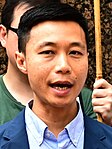| |||||||||||||||||||||||||||||||||||||||||||||||||||||||||||||||||||||||||||||||||||||||||||||||||||||||||||||||||||||||||||||||||||||||||||||
264 (of the 470) seats in all Districts Councils | |||||||||||||||||||||||||||||||||||||||||||||||||||||||||||||||||||||||||||||||||||||||||||||||||||||||||||||||||||||||||||||||||||||||||||||
|---|---|---|---|---|---|---|---|---|---|---|---|---|---|---|---|---|---|---|---|---|---|---|---|---|---|---|---|---|---|---|---|---|---|---|---|---|---|---|---|---|---|---|---|---|---|---|---|---|---|---|---|---|---|---|---|---|---|---|---|---|---|---|---|---|---|---|---|---|---|---|---|---|---|---|---|---|---|---|---|---|---|---|---|---|---|---|---|---|---|---|---|---|---|---|---|---|---|---|---|---|---|---|---|---|---|---|---|---|---|---|---|---|---|---|---|---|---|---|---|---|---|---|---|---|---|---|---|---|---|---|---|---|---|---|---|---|---|---|---|---|---|
| Registered | 4,329,710 (GC)[1] | ||||||||||||||||||||||||||||||||||||||||||||||||||||||||||||||||||||||||||||||||||||||||||||||||||||||||||||||||||||||||||||||||||||||||||||
| Turnout | 1,195,331 (27.59%)[2] | ||||||||||||||||||||||||||||||||||||||||||||||||||||||||||||||||||||||||||||||||||||||||||||||||||||||||||||||||||||||||||||||||||||||||||||
| |||||||||||||||||||||||||||||||||||||||||||||||||||||||||||||||||||||||||||||||||||||||||||||||||||||||||||||||||||||||||||||||||||||||||||||
 Map of the winning party (in circles) and vote share of top candidate by constituency | |||||||||||||||||||||||||||||||||||||||||||||||||||||||||||||||||||||||||||||||||||||||||||||||||||||||||||||||||||||||||||||||||||||||||||||
The 2023 Hong Kong District Council elections were held on 10 December 2023 for all 18 District Councils of Hong Kong, electing 264 of the 470 seats in the councils.[3] Under the new electoral system, 88 of the elected 264 seats were directly elected by 4.3 million voters, while 176 of them were indirectly elected among some 2,400 members of the government-appointed District Committees. More than one-third of the remaining seats were appointed by the Chief Executive.
The electoral changes passed earlier in the year revived appointed seats in the deliberation bodies, introduced seats elected by government-appointed District Committees, and tightened eligibility with vetting and mandatory nomination from the District Committee members. As a result, this is the first election in Hong Kong contested by pro-Beijing candidates only,[4] as the pro-democracy camp, which won a landslide in the last election amidst protests, had faced challenges since under the national security law, and under the new electoral rules, both pro-democracy and moderate parties failed to earn enough nominations to enter the race.
Despite the government's efforts to boost the voter turnout, only 1.19 million voters, or 27.5% of registered voters cast their ballots, the lowest ever in the Hong Kong District Council's history and the lowest among all elections since China took control of Hong Kong. The largest pro-Beijing party, the Democratic Alliance for the Betterment and Progress of Hong Kong (DAB) regained its status as the largest party in the district councils, winning 109 seats, while many smaller parties, which lacked strong community networks and resources, failed to win many seats.
- ^ "Voter Registration Statistics". Registration and Electoral Office.
- ^ "Voter Turnout Rate". Electoral Affairs Commission.
- ^ "區議會選舉12月10日舉行". 香港政府新聞網. 2023-07-24.
- ^ "「整頓」後首屆香港區議會選舉以「史上最低」投票率落幕". BBC News 中文 (in Traditional Chinese). 2023-12-11. Retrieved 2023-12-28.
Cite error: There are <ref group=lower-alpha> tags or {{efn}} templates on this page, but the references will not show without a {{reflist|group=lower-alpha}} template or {{notelist}} template (see the help page).
© MMXXIII Rich X Search. We shall prevail. All rights reserved. Rich X Search







